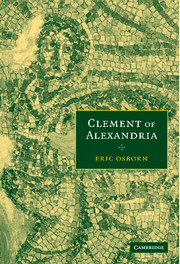Book contents
- Frontmatter
- Contents
- Preface
- List of abbreviations
- 1 Life and works
- PART I DIVINE PLAN/ECONOMY
- PART II DIVINE RECIPROCITY
- PART III FAITH AND SALVATION
- 7 The Spark and ferment of faith (exc 1.1.3)
- 8 Arguments for faith
- 9 Knowledge, sciences and philosophy
- 10 Church and heresy
- 11 Twofold hope
- 12 Love and reciprocity
- Conclusion
- Appendix: Irenaeus and Clement
- Select Bibliography
- Subject index
- Citations from Clement
- Citations from the Bible
- Citations from ancient authors
7 - The Spark and ferment of faith (exc 1.1.3)
Published online by Cambridge University Press: 06 July 2010
- Frontmatter
- Contents
- Preface
- List of abbreviations
- 1 Life and works
- PART I DIVINE PLAN/ECONOMY
- PART II DIVINE RECIPROCITY
- PART III FAITH AND SALVATION
- 7 The Spark and ferment of faith (exc 1.1.3)
- 8 Arguments for faith
- 9 Knowledge, sciences and philosophy
- 10 Church and heresy
- 11 Twofold hope
- 12 Love and reciprocity
- Conclusion
- Appendix: Irenaeus and Clement
- Select Bibliography
- Subject index
- Citations from Clement
- Citations from the Bible
- Citations from ancient authors
Summary
Clement's account of faith indicates the two sources of all his work: derivation from scripture and use of philosophy. In scripture he now begins from Paul, first from Corinthians and then from Romans. His main points may be set out. The act of faith unifies the believer in dependence on one object and source, namely the power of God. Faith is achieved through an interaction between believer and God, between reasoning and perception, between seeking and finding. Faith is joined to knowledge by reciprocity (2.4.16.2) in a process of growth. Faith has a firm beginning, continuity and a necessary development. Faith is a rational act and sees the whole divine economy under one God. We shall look at these points in their order.
THE POWER OF GOD AND THE UNITING FORCE OF FAITH
The wisdom of the world is folly before God, on whose power faith continually depends (1.11.50; 1 Cor. 3:19f; 2 Cor. 1:9, 10; 1 Cor. 2:1–5). Faith unites the believer in one obedience and one dependence. This is his sole possession, the unique good which no one can take away; most precious, it joins him to the one who suffered, and it flows out in good works to his fellow-men. Pretensions are denied and the glory of the world is stripped away, so that God alone is followed (paed 2.3.36.2).
- Type
- Chapter
- Information
- Clement of Alexandria , pp. 159 - 181Publisher: Cambridge University PressPrint publication year: 2005



